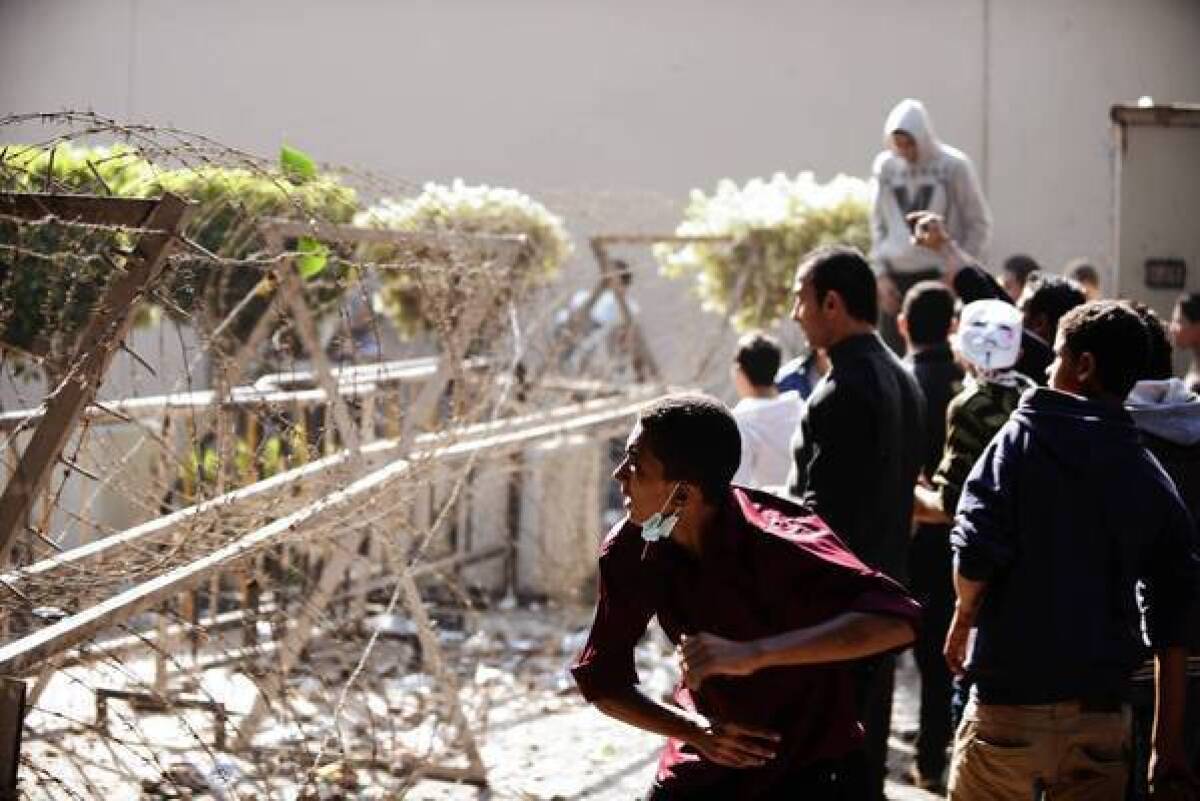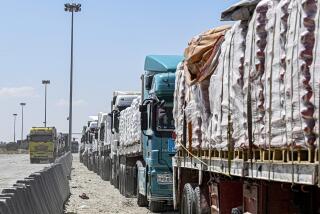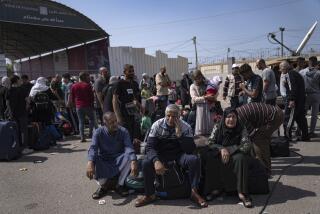Egypt stock exchange falls, protesters converge on Tahrir Square

CAIRO — Security forces built a wall to contain stone-throwing protesters and Egypt’s stock exchange tumbled Sunday amid growing unrest over President Mohamed Morsi’s decision to expand his powers in a nation dispirited and angered by months of uncertainty.
The country’s main stock index fell nearly 10% in one of the most bruising days of trading since the 2011 uprising that toppled longtime autocrat Hosni Mubarak. Morsi’s power grab left traders fearful that foreign investors — desperately needed to rescue Egypt’s troubled economy — would shy away from the nation in light of the latest spasm of political instability.
“The market is witnessing one of its worst moments in history. The current regime is a mirror image of the previous one,” Hisham Tawfik, an executive board member on the Egyptian stock exchange, told the newspaper Al Masry al Youm. The government, he said, has continued to “ignore the concerns of investors.”
He added: “Egypt [could] declare bankruptcy in a matter of three months if the current economic situation remains as is.”
In an effort to calm widening furor, Morsi’s office released a statement later in the day that was at once conciliatory and adamant even as his justice minister questioned the wisdom of the decree at such a politically sensitive time. The statement said the president has a “firm commitment to engage all political forces ... and bridge the gap in order to reach a national consensus.”
That did not deter thousands of protesters from converging on Tahrir Square. Hundreds more, mostly young men and boys, their faces covered by rags to shield them from volleys of tear gas, battled with police on side streets as cranes lifted blocks into place for a dividing wall.
The Muslim Brotherhood’s Freedom and Justice Party said one of its members was killed when anti-Morsi protesters attacked one of its offices outside Alexandria. The state news agency reported that 297 people have been injured in days of demonstrations.
“I’m demanding that Morsi sit down with the opposition and listen to the different people of Egypt. He must also retract his decree and reform the police system,” said Arafat Moawad, a protester in Tahrir. “He needs to do these things in order to become a president for all Egyptians. Now, he is just a president for [his] Muslim Brotherhood movement.”
Pressure on Morsi, the nation’s first Islamist president, has intensified since Thursday, when he announced his office was above judicial oversight. He had earlier taken over broad executive and legislative authority and the latest move left his powers unchecked.
Judges have threatened a national strike; some courts have stopped working in Alexandria and other cities. Leading opposition figures, including Nobel laureate Mohamed ElBaradei, have warned that if Morsi doesn’t rescind his decree, the country could slide into violence.
But, so far, the strikes and crowds of protesters do not appear large enough or possess the momentum to threaten Morsi’s grip on power. The Supreme Judicial Council, the leading judges’ authority, opposes the president’s decree but advised its members against striking. Efforts by Justice Minister Ahmed Mekki were also underway to reach a compromise, and Morsi was expected to meet with leading judges in coming days.
The president has explained his decree as an attempt to limit the influence of Mubarak-era judges who have threatened the nation’s political transition. His statement Sunday said his move was not “intended to concentrate power, but to avoid ... attempts to undermine democratically elected bodies and preserve the impartiality of the judiciary.”
In June, the Supreme Constitutional Court dissolved the Islamist-led parliament. Morsi feared the judges would do the same next month in a case to decide the fate of the Islamist-dominated assembly drafting the constitution. Secularists, women and non-Muslims have accused the assembly of seeking to impose sharia, or Islamic law, at the expense of civil rights.
While anti-Morsi protesters chanted against him in Tahrir Square, legions of Islamists, including members of Morsi’s dominant Muslim Brotherhood, backed the president. The nation is increasingly torn, and the president, a political novice whose Brotherhood party is known for its authoritarian streak, has yet to placate those calling him a dictator and a pharaoh.
Tahrir, as during the final days of Mubarak, has turned into a self-sustaining city of protest, with sweet potato sellers and other vendors supplying demonstrators camped in about 30 tents. Tear gas drifts in from outlying streets, flags flap, banners rustle. Many are concerned not only about politics but about livelihoods.
“I can’t find a job to feed my kids. The political climate has destroyed our line of business,” said Gamal Dabees, a tourism agency employee. “Tour companies and clients have been canceling trips and visits to Egypt since the revolution. We barely work now. With this kind of decree, how can business thrive? There is no law in the land.”
Abd ElBaki Habiby, a 65-year-old engineer, worried about deeper national consequences.
“Morsi has threatened the stability of this nation because his loyalty is not to the Egyptian people, but rather to the Brotherhood who are going to destroy the reputation of Islam because of their ignorance and backward personal beliefs,” he said.
Abdellatif is a special correspondent.
More to Read
Sign up for Essential California
The most important California stories and recommendations in your inbox every morning.
You may occasionally receive promotional content from the Los Angeles Times.











